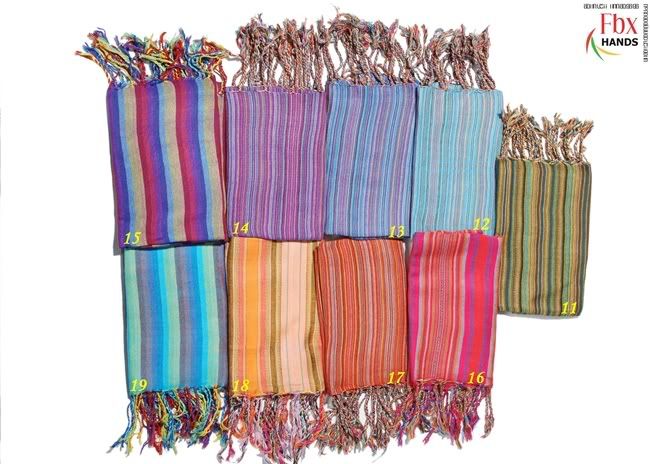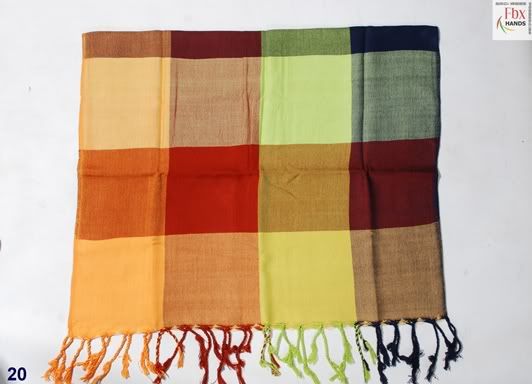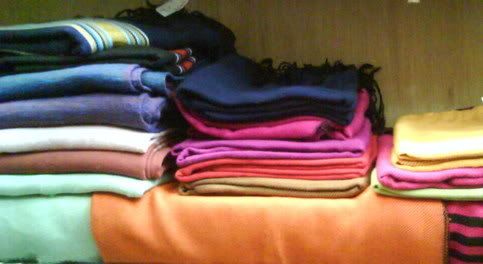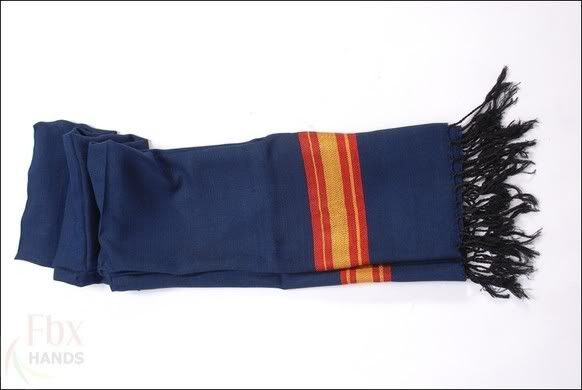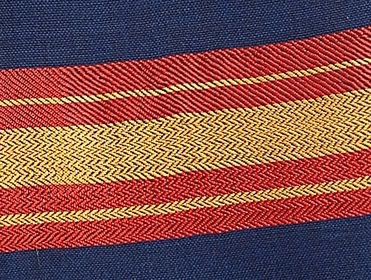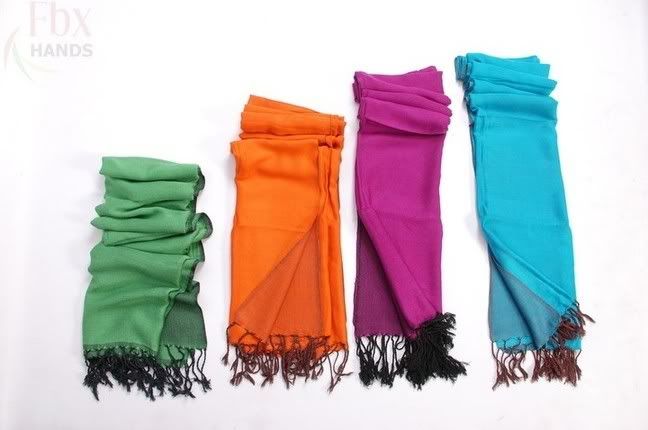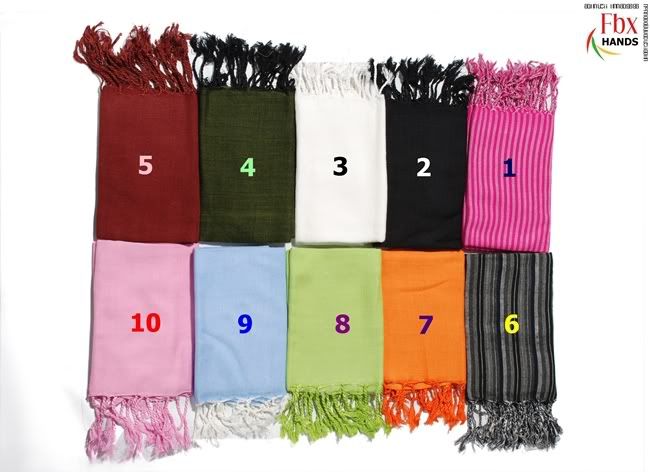
Sunday, August 23, 2009
Friday, March 6, 2009
Viscose Products, Handwoven in Egypt
Viscose is a type of rayon. It's a man-made fiber made from purified cellulose, which usually comes from specially processed wood pulp. Viscose is very similar to cotton and silk. (Cotton is also made of cellulose).
Most people assume that there are two kinds of fibers: natural ones, like cotton, wool and silk; and artificial ones synthesized out of petrochemicals like nylon and polyester. Viscose falls somewhere in between. The raw material for viscose is cellulose which is broken down either mechanically or chemically and reformed as fibers. Trees are 50% cellulose, cotton is 90% cellulose, so viscose is more accurately described as a natural, or recovered, fiber.
Viscose rayon has a silky appearance and feel, and also has the ability to breathe in a manner similar to cotton weaves.Contact me on: ahmad2161 (@) gmail (dot) com
Sunday, March 1, 2009
Hand made in Nagada - Egypt
Plain, one-color scarf
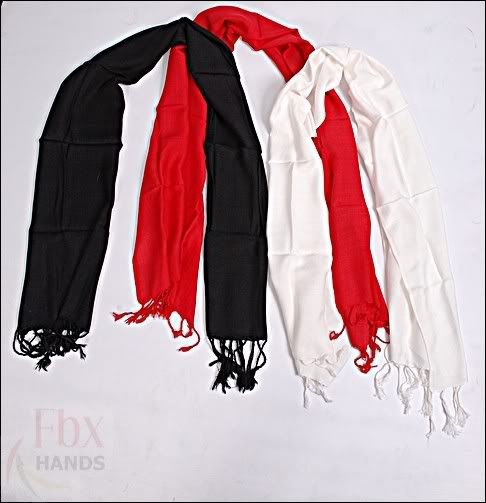
Click here for a bigger version
One-face, striped scarf
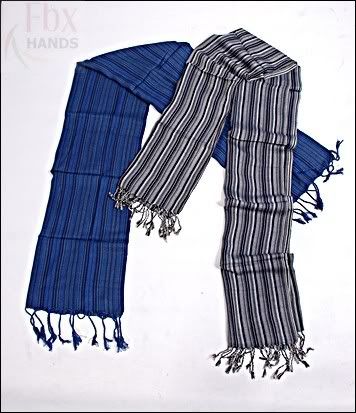
Click here to see a bigger version of the photo

Click here for a bigger version
One-face, striped scarf

Click here to see a bigger version of the photo
Nagada Trip
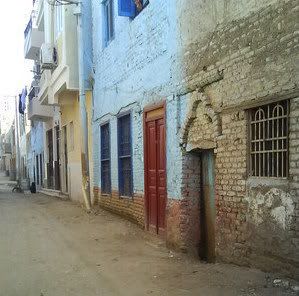
In this visit to Nagada, i found out that the old man Pharah has retired for the time being because of his ill health, which saddened me. He recommended his student, Adel, who now leads some weavers who were also trained by Paharah, the old experienced craftsman.
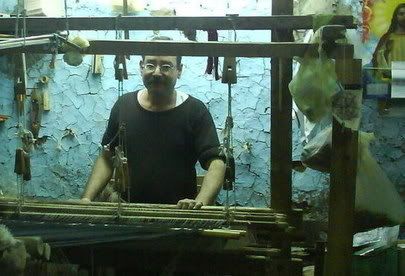
To my surprise, it turned out that Adel, the student has surpassed his teacher Paharah, and mastered new techniques of weaving, like the double-face and zigzag styles.
Adel told me that the craft is in decline, since most weavers are turning to other fields of work because of the drop in demand, migration of skilled weavers is a major problem, also another problem is the absence of good quality Egyptian yarns, which forces them to use imported yarn threads.
I believe that if there is a concentrated effort and enthusiasm to revive such handicrafts, we can achieve some balance and restore the dignity and livelihood of those long-forgotten communities, not only in Egypt, but around the world.
The Weavers' Revolution
 The Luddites revolution was sparked in the UK in 1811 when the introduction of the weaving machines (known as frames) started affecting the lives of the weavers and threatened their handicraft. Nobody knows for exact who is general Ned Ludd who signed the letters threatening to destroy the frames, the revolution started in Nottingham by breaking hundreds of the new frames and then spread like wild fire to many other areas in the UK, to the extent that the parliament passed the "frame breaking act" which considers destroying the factory machines, a capital offense. Lord Byron, the romantic poet delivered a speech in the parliament defending the weavers,
The Luddites revolution was sparked in the UK in 1811 when the introduction of the weaving machines (known as frames) started affecting the lives of the weavers and threatened their handicraft. Nobody knows for exact who is general Ned Ludd who signed the letters threatening to destroy the frames, the revolution started in Nottingham by breaking hundreds of the new frames and then spread like wild fire to many other areas in the UK, to the extent that the parliament passed the "frame breaking act" which considers destroying the factory machines, a capital offense. Lord Byron, the romantic poet delivered a speech in the parliament defending the weavers,"But whilst these outrages must be admitted to exist to an alarming extent, it cannot be denied that they have arisen from circumstances of the most unparalleled distress: the perseverance of these miserable men in their proceedings, tends to prove that nothing but absolute want could have driven a large, and once honest and industrious, body of the people, into the commission of excesses so hazardous to themselves, their families, and the community.Lord Byron even wrote a poem praising the Luddites revolution, but the revolution soon died out (1817) after the government executed tens of the weavers and transported others to Australia.
They were not ashamed to beg, but there was none to relieve them: their own means of subsistence were cut off, all other employment preoccupied; and their excesses, however to be deplored and condemned, can hardly be subject to surprise."-Lord Byron
I think the Luddites revolution was one of the most important turning points in history. It took the intervention of the British army to quench that angry revolution, that was maybe the start of confrontation between the governments and their own people, for the governments started siding with the corporation and started ignoring the livelihood of the people.
As the Liberty lads o'er the sea
Bought their freedom, and cheaply, with blood,
So we, boys, we
Will die fighting, or live free,
And down with all kings but King Ludd!
When the web that we weave is complete,
And the shuttle exchanged for the sword,
We will fling the winding-sheet
O'er the despot at our feet,
And dye it deep in the gore he has pour'd.
Though black as his heart its hue,
Since his veins are corrupted to mud,
Yet this is the dew
Which the tree shall renew
Of Liberty, planted by Ludd!
The Luddites were not against technology as one may be tempted to think.
"It is easy to forget how evil a reputation the new cotton mills had acquired. They were centers of exploitation, monstrous prisons in which children were confined, centers of immorality and of industrial conflict; above all, they reduced the industrious artisan to 'a dependent State.' A way of life was at stake for the community, and hence, we must see the croppers' opposition to particular machines as being very much more than a particular group of skilled workers defending their own livelihood. These machines symbolized the encroachment of the factory system." - E.P.Thomson 1968Their revolt was against the take over by the capitalist corporation, which used the industrial revolution as a vehicle to deny the people of their basic rights of living with dignity. But even Communism was not the answer to the capitalist problem, i think what we need is to encourage the people to have a say on whatever affects their lives.
Now is the time for a new kind of revolution, led by the people, not against technology or capital, but against exploitation and the unbalanced approach of using technology on the expense of the human hand. Specially that the current economic system has failed miserably with the global financial crisis, people now will think twice before spending their money, and i think handmade products offer the quality and value needed to substitute the soulless mass produced products.
So let us give the weavers and all the craftsmen a helping hand, by opening alternative markets for them and gradually a responsible fair marriage between their crafts and technology can be achieved, man and machine can coexist as long as the machine is a tool for the man, but now the labor is more of a tool to the machine, that's because monopoly capital controls the scene, not the people themselves. I believe a better dignified future is just around the corner.
Saturday, February 28, 2009
Nubia Trip - 2

The Nubian people will never forget the 60's when president Nasser decided to build the high dam, the Aswan dam created a reservoir behind it, a big lake (lake Nasser) the largest in the world (310 miles in length) washed away over 45 Nubian villages, and forced thousands of Nubians to move away from the lands they inhabited for more than 5000 years.
The Nubians used to survive on farming, fishing and trade, but now they have to move to the cities to find work, leaving their own communities in the new Nubian villages with unsustainable environments, specially that they were relocated to sandy lands away from the river. The Sudanese government is now in the process of building the Merowe dam on the third cataract of the river Nile, which will cause the same destruction and relocation of thousands of Nubians in northern Sudan!.
Nubian handmade work:
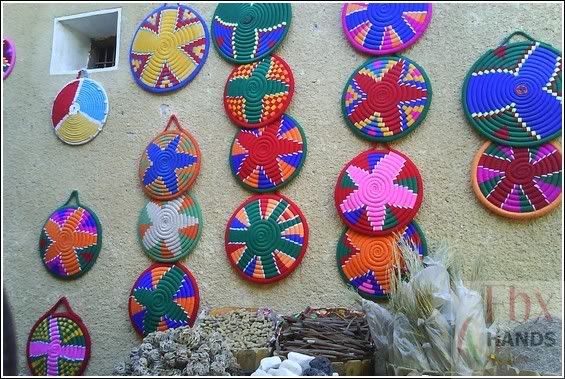
Colorful cotton thread woven plate, the plate is made from the leaves of palm trees, used as a basket cover or decoration on the wall.
Nubian women are famous for their beads work, like this glittering beaded shawl, this one is using silver colored beads.
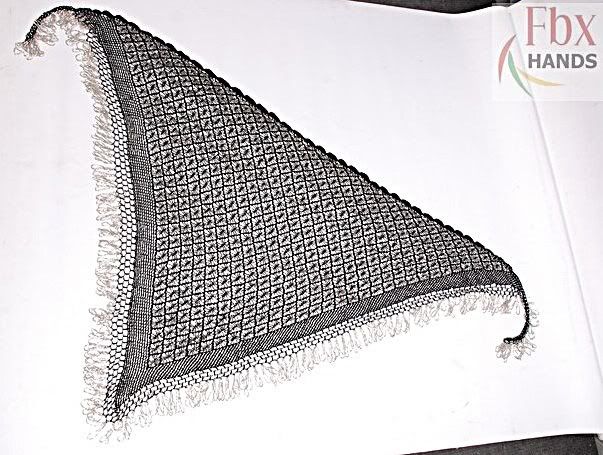
and with golden beads,


Nubia Trip - 1
 I have just come back from a trip to both Nubia and Nagada in Southern Egypt. The Nubian civilization goes back to 3800 years BC, the Nubian kings ruled Egypt during the 25th dynasty for about a 100 years. Nubians look different than both the Africans of the south in Sudan and the Egyptians of the north of Egypt, they have darker skin than the Egyptians of the north and finer facial features than the Africans of Sudan, Nubia extends from the southern part of Egypt (Aswan) to the northern parts of Sudan.
I have just come back from a trip to both Nubia and Nagada in Southern Egypt. The Nubian civilization goes back to 3800 years BC, the Nubian kings ruled Egypt during the 25th dynasty for about a 100 years. Nubians look different than both the Africans of the south in Sudan and the Egyptians of the north of Egypt, they have darker skin than the Egyptians of the north and finer facial features than the Africans of Sudan, Nubia extends from the southern part of Egypt (Aswan) to the northern parts of Sudan.I went with a nubian friend Abd Elsalam to two Nubian villages Gharb Sohail and Eneiba, you can see him and myself (wearing the red scarf) in the video, you can also notice the distinct Nubian style of building in the video.
The singer is also Nubian, his name is Hasan Abdel Magid, the song says something like "Masr, Egypt is the gentle breeze on the nights, the jasmine sellers, and a rusty mirror in the cafe that i visit and take a look at, Masr is the turquoise sky, the passing birds, and the humid Qolla (Egyptian water clay cooler) filled with water on the window, and the grandfather sitting cross legged reading the Journal."
Subscribe to:
Comments (Atom)

